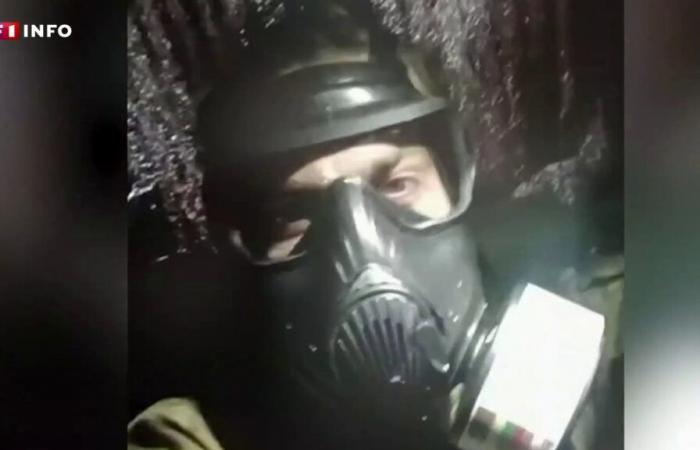A year after having noticed the use of incapacitating gas by Russian forces on the front, an LCI team returned to the site.
Attacks using chemical weapons have intensified, with the use of more dangerous agents, such as chloropicrin.
Follow the full coverage
War in Ukraine: TF1 and LCI on the ground
“Our position was gassed, it’s shit.” As peace negotiations between Ukraine and Russia skate (new window)on the Ukrainian battlefield, the use by the Russian forces of chemical ammunition (new window) “with systemic”. The army of Vladimir Putin drops them by drones to flush out the enemy soldiers from their caches. According to figures provided by the Ukrainian Ministry of Defense, these prohibited weapons were used at least 767 times in March (new window)in violation of international laws.
last year, during a previous report (new window)an LCI team had already observed the use of incapacitating gas by Moscow troops. It was then mainly of CS gas, a tear gas agent (new window) Very powerful, prohibited as part of a conflict armed by the Convention on Chemical Weapons (CIAC) (new window) from 1993, signed by Russia.
Since then, he has been replaced by chloropicrin, a more dangerous suffocating agent. Used during the First World War, this very toxic substance causes serious irritation of the skin, eyes, respiratory tract (in case of inhalation) and digestive tract (in case of inhalation or ingestion). In the event of serious exposure, it can be fatal and generate “A potentially fatal accumulation of liquid in the lungs”. Its use by the Russian army was denounced in May 2024 by the United States, allegations rejected as “Based” by the Kremlin.
We had a strong blood taste in the mouth
Hector, member of the Brattalion Bratstvo
A version contradicted in the field. Two elite shooters, which we met, say they felt “Very strong and very lively pain in the airways”after being gassed last month. “Our vision has become blurred and we started vomiting”testifies to our micro Hector, member of the Brattalion Bratstvo.
“I had a kind of allergic reaction that appeared on the skin after an hour”bounces his comrade Ohrem. “We had a strong taste of blood in the mouth, when the examination showed that we had no injury in the mouth”resumes Hector, who had to be hospitalized for a week, like his companion. “The taste for blood came from damage in our respiratory tract.”
Attacks have almost become a new normality
Borghese, Battalion Commander Bratstvo
In this region of eastern Ukraine, Borghese, the commander of this Ukrainian intelligence unit, draws an overwhelming observation: the use of these ammunition by the Russian forces has increased considerably.
“We were deployed here, about two months ago, and at that time, there were gas attacks approximately once a week in certain positions”explains the commando chief. “But now, it’s much more. Attacks on gas and chemical ammunition have almost become a new normality. There is not a single position on which the Russians have not launched a chemical pomegranate with chlorine. All we can do is equip all our men with gas masks.”
-
Read
Did Ukrainian soldiers detained in Russia admit the use of chemical weapons to infect the waters of Kherson?
In this winding sector, where evacuation can take up to several days, evidenced by vehicles targeted by drone attacks, Ukrainian soldiers have no choice but “s’adapter”. They must “Do with this yet another red line crossed” by Russia.








